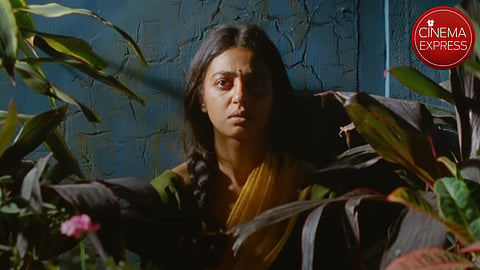Sister Midnight Movie Review: Radhika Apte is electrifying in this gloriously unhinged horror satire
Sister Midnight(3 / 5)
From its very first scene, Sister Midnight makes it clear it will not follow the usual rules. You might expect something soft, perhaps melancholic, as Uma sits on a night train heading into her new life. Instead, the background soundtrack bursts in with blues, and suddenly you wonder if you’ve walked into the wrong film. You haven’t. You’ve just stepped into debut filmmaker Karan Kandhari’s wild and wonky world, where a lonely housewife’s journey unfolds amid birds, goats, and more than a little blood. Uma (Radhika Apte) is a newlywed bride who has just moved to Mumbai with her husband, Gopal (Ashok Pathak). Their relationship is odd from the start. There is no honeymoon phase, no warmth, not even a kiss. Gopal mostly works, drinks, and falls asleep, while Uma, confused and increasingly frustrated, tries to make sense of her new home. It’s a one-room house with thin walls. Uma, however, is not one to sit around waiting for love or logic. She is bored, horny and surrounded by noisy neighbours who seem to be living their best lives. She’s also silently judged for not knowing how to cook or keep house. There is Sheetal, her next-door neighbour and friend, played with perfect bite by Chhaya Kadam, who teaches her to throw spices into anything and serve it like magic.
Director: Karan Kandhari
Cast: Radhika Apte, Ashok Pathak, Chhaya Kadam, Smita Tambe
Bored and ignored, Uma starts venturing outside, meeting people on the margins who welcome her without asking too many questions. On the way to her new workplace, she passes a group of trans women who gently mock her skin tone. Everyone assumes she’s using some whitening cream. No one suspects she is becoming something else entirely over the course of her rocky marriage. With these women, she slowly forms an unlikely connection, as they do not judge her and embrace her for who she is. While the film begins on relatively grounded yet odd terms, it gradually descends into something far stranger. The film is also unabashedly violent in parts, featuring scenes that are visceral and not for the faint of heart. As the story begins to spiral, the film turns increasingly macabre. There are goats. There are birds. Some look as if they’ve wandered in from a haunted farm. The VFX is deliberately tacky. When a herd of goats appears to be in control of Uma later in the film, your brain might ask, “What on Earth?” Yet somehow, it works. Once you settle into the film’s strange rhythm, these oddities begin to feel right at home.
What emerges through the madness is a potent, sometimes unsettling strain of feminist horror. This is not the kind that draws attention to itself with slogans or speeches. Instead, it creeps in through Uma’s isolation, the policing of her body, the erasure of her desires, and the suffocating expectations placed upon her. Her transformation becomes a form of rebellion, messy and monstrous, but unmistakably her own. Visually, the film is a treat. The street scenes at night glow with neon and grit, bursting with life. There is a rough charm to the chaos. It mirrors Uma’s internal mess, which grows by the day. She grows paler. Everyone offers unsolicited advice. Meanwhile, Gopal remains clueless and the neighbours continue to whisper. The turning point comes when Uma and Gopal attempt to make sense of what’s happening to her and try awkwardly and desperately to patch things up. Their efforts to fix things only fuel the madness, setting the tone for a bonkers third act, filled with oddly funny moments and a liberating air.
Radhika is in electrifying form here. Uma is neither your typical horror lead nor your standard Indian housewife. She is sharp, blunt, funny, and increasingly unhinged. Radhika handles every shift with total control. One minute she is muttering a crude joke, the next she is silently staring into space, thinking who-knows-what. Her performance makes even the smallest gestures feel meaningful, whether cleaning a floor or glaring at a goat. She is the anchor that holds the madness together. That said, the film is not all smooth sailing. It starts to wobble in parts, especially in the second act, going in circles as the story gets darker and bloodier. Some scenes feel repetitive, and there is a sense that Karan had more ideas than time to explore them. The modest runtime leaves a few loose ends dangling as well. A bit more space could have helped unpack the emotional layers underneath all the oddness.
Still, Sister Midnight is a satire that sticks with you. It is funny, gross, and occasionally terrifying. It pokes at real issues, too, from gender expectations to emotional abandonment. But it never preaches. It lets the absurdity speak for itself. When Uma says, “Funny how we get used to things,” the line hits harder than any big dramatic speech. That is the kind of film this is. Quietly sharp, loudly strange, and unapologetically different. In a sea of predictable horror films, Sister Midnight is a rare creature. It is weird and scrappy and does not care if you are keeping up. And that is exactly what makes it so much fun.

